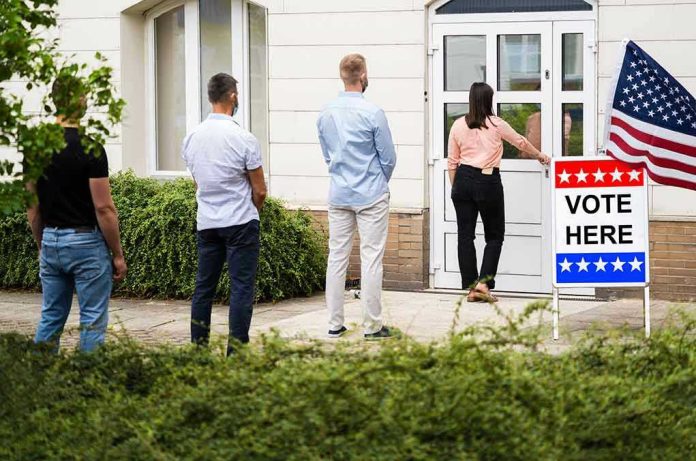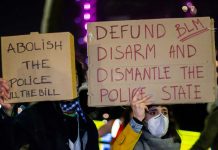
President Trump’s vow for a nationwide, no-exceptions voter ID mandate sets the stage for a major constitutional battle over state authority and election integrity.
Story Highlights
- Trump announces intent to issue an executive order requiring voter ID for all U.S. elections, with no exceptions.
- Proposal would sharply restrict mail-in voting to only the very ill and military personnel, and mandate paper ballots.
- Legal experts and state officials warn the plan faces constitutional barriers, as states control election procedures.
- Previous executive orders on voting have already triggered lawsuits and court injunctions.
Trump’s Voter ID Executive Order: A Sweeping Federal Push
On August 31, 2025, President Trump publicly declared his plan to issue an executive order requiring voter identification for every U.S. election, emphasizing that there would be “no exceptions.” In the same announcement, he called for sharp restrictions on mail-in voting, limiting it to only the very ill and military personnel stationed far from home, and insisted on the exclusive use of paper ballots. While these proposals align closely with long-standing conservative priorities—securing the ballot box and restoring trust in elections—Trump has yet to release any detailed order or timeline for implementation.
This campaign for voter ID is framed as a response to widespread concerns about election fraud and the eroding confidence in the electoral process. The move comes as the nation heads toward the 2026 midterms, with recent history marked by contentious debates over election security, mail-in ballots, and the legitimacy of past races. Supporters argue that requiring ID is common sense, mirroring requirements for everyday activities like driving or banking. However, critics claim such mandates could disenfranchise voters who lack government-issued identification, particularly among minorities, the elderly, and lower-income Americans.
Constitutional Challenges and State Authority
Despite the strong rhetoric of “no exceptions,” the U.S. Constitution gives states—not the federal executive—the primary authority to administer elections. Historically, Congress can set certain standards for federal races, but the president cannot unilaterally rewrite voting rules nationwide. Legal experts across the spectrum agree that Trump’s proposal will face immediate court challenges, with previous executive orders on voting already blocked or delayed by federal judges. Even some Republican state officials, while supporting voter ID in principle, have publicly opposed blanket bans on mail-in voting, citing secure absentee ballot practices and the risk of disenfranchising voters who rely on them.
Earlier in March 2025, Trump signed an executive order requiring documentary proof of citizenship for voter registration—a move that was promptly challenged in court and remains under injunction. This underscores the fierce legal and constitutional battles likely to follow any attempt at sweeping federal mandates in this area. The push for a national voter ID law, while popular among many conservative voters, directly tests the limits of executive power and the long-standing principle of state-led election administration.
Potential Impact on Voters and Elections
If enacted and upheld, a federal voter ID requirement would represent a dramatic shift in how U.S. elections are run. Supporters believe it would finally deliver on promises of election integrity and prevent fraudulent voting. Opponents counter that research shows voter fraud is exceedingly rare, and strict ID requirements risk disenfranchising eligible citizens—potentially shifting election outcomes by reducing turnout among those least likely to possess government-issued identification. The administrative burden and cost for states could be significant, and the resulting legal battles are likely to expand the already intense partisan divide over election rules.
Beyond the legal and logistical hurdles, the proposal’s sweeping nature—eliminating nearly all mail-in voting and mandating paper ballots—would require massive changes for many states. Some Republican election officials have warned that such abrupt changes risk confusion, delays, and even unintended consequences for military and overseas voters. As the 2026 midterms approach, courtrooms will become the primary battleground over who gets to cast a ballot and under what conditions, with the ultimate outcome likely to shape the future of American democracy.
Trump Announces Plan for Voter ID Executive Order: 'No Exceptions!': It’s about time we got serious about election integrity. pic.twitter.com/ukaLy66p73
— TRUE Q PATRIOT ✨ (@TrueQPatriot1) September 2, 2025
Stakeholder Reactions and the Path Forward
The announcement has galvanized both supporters and critics. Trump and his base frame the push as a necessary correction to years of lax voting protocols and a vital defense against voter fraud. Civil rights groups, Democratic leaders, and some election officials warn that the federal overreach threatens to undermine the core constitutional principle of state-run elections and could suppress lawful votes. As the White House legal team drafts the executive order, key stakeholders—including Congress, the judiciary, state governments, and advocacy organizations—are preparing for a protracted battle over the future of election law in America. With the specifics and legal rationale still unreleased, uncertainty remains high, but one thing is clear: the issue of voter ID and federal authority over elections will remain at the center of national debate in the coming months.
Sources:
President Trump plans to issue executive order to require voter identification
Trump says he plans to issue unconstitutional order requiring voter ID and banning mail ballots
Preserving and Protecting the Integrity of American Elections









